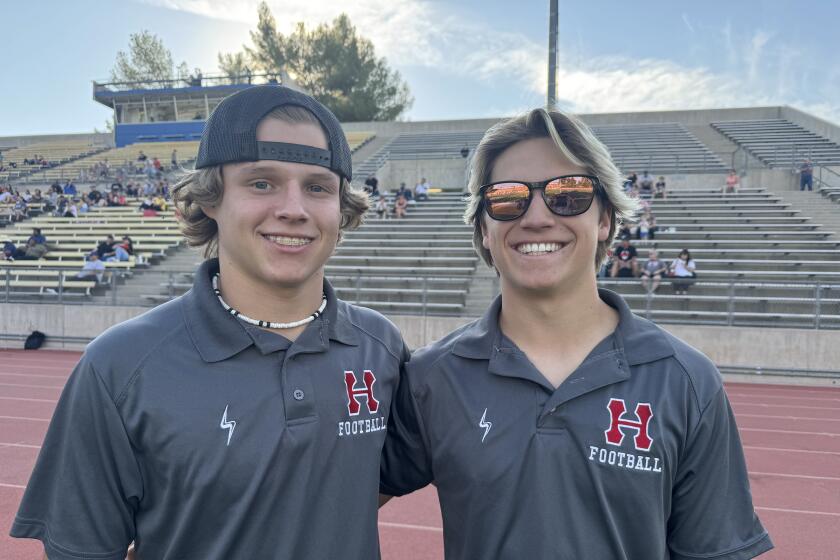Florida Gators team physician invented drink known worldwide
- Share via
Dr. J. Robert Cade, who invented the sports drink Gatorade more than 40 years ago to help the University of Florida football team stay hydrated and in turn inspired the multimillion-dollar sports beverage industry, has died. He was 80.
Cade, a medical researcher and kidney specialist who had been in declining health for some time, died Tuesday at Shands, a private hospital at the University of Florida Medical Center in Gainesville, the university announced.
On Nov. 16, Cade attended a ceremony to dedicate a historical marker on campus in honor of “Gatorade’s Birthplace . . . the sports drink that started an industry.”
When Gatorade was invented in 1965, there was nothing like it on the market. The researchers’ goal was to help the Florida players survive playing in swamp-like heat.
The drink has come to dominate the market, and the post-game “Gatorade dunk” of a winning coach has become a cliche. In 2006, Gatorade held more than 80% of the $7.5-billion-a-year U.S. sports drink market, according to Beverage Digest. Since 1973, the University of Florida has collected more than $150 million for its 20% share of the royalties.
A trust made up of people who worked on the project and their heirs shares the other 80%. Cade reportedly received 10% of the trust’s royalties yet never moved from the home in which he raised six children and lived in while leading the Gatorade research team.
Initially called Cade’s Cola, the drink began gaining national attention when the Florida Gators credited their stamina during their 1967 Orange Bowl win to the concoction.
The mixture was devised after a football coach expressed frustration that his players had trouble enduring Florida’s hot weather, and after a player registered a complaint with Cade, who was then the team’s physician.
“One of the players came to me and commented about not urinating during football practice,” Cade told the Orlando Sentinel last year.
He led a team of four researchers who studied the problem by doing experiments on the freshman squad because the coach didn’t want them experimenting on the varsity.
NCAA regulations prevented Cade from compensating the players for the time they spent giving blood and sweat samples, so he rewarded them with steak dinners.
Researchers quickly figured out that the athletes lost so much weight to sweat -- sometimes as much as 10 pounds during a practice -- that they needed a drink that would replace the lost carbohydrates and electrolytes.
Developed so that water and sodium could be more readily absorbed in the intestinal tract, the drink also included sugar, a key source of energy, and phosphate to help burn the sugar.
The first batch of what would become Gatorade tasted so vile, it made researchers sick.
“So I learned the old lesson: If at first you don’t succeed . . . ask someone smarter,” Cade said in a 1994 speech at an innovation workshop. “So that was my wife,” who told him to add lemon juice and artificial sweetener “because that usually covers up any bad taste.”
The Gators became known as a second-half team because they often dominated opponents later in the game.
The Florida Times-Union in Jacksonville heralded a 1966 win with the headline: “One Lil’ Swig of That Kickapoo Juice and Biff, Bam, Sock -- It’s Gators, 8-2.”
As interest in the drink spread, Cade offered his patent rights to the University of Florida. The school turned him down but later engaged in a protracted court battle over royalty rights and struck a deal in 1973.
Stokely-Van Camp bought the rights to Gatorade in 1967 and had it in supermarkets a year later. Quaker Oats bought the rights in 1983 and began marketing it nationally.
When PepsiCo acquired Quaker Oats in 2001, Gatorade had worldwide sales in the billions.
The drink is now sold in 80 countries, in dozens of flavors.
After Gatorade began emphasizing the drink’s University of Florida origins in recent years, Cade filmed a television commercial in which he announced, with a pronounced Southern twang, “Naturally, we called our stuff Gatorade.”
For Cade, the most rewarding aspect of his invention came far from the playing fields. Gatorade is used in hospitals, to aid in post-operative recovery and to treat diarrhea in children.
“It’s the feeling that I’ve made the world a better place to live,” Cade said in the 2006 Orlando Sentinel article. “Pediatricians rely on the drink when they work with patients, and people in Third World countries who suffer from cholera have a heavy reliance on Gatorade. That’s the best part.”
James Robert Cade was born Sept. 26, 1927, in San Antonio, and graduated from the University of Texas at Austin and the University of Texas Southwestern Medical School in Dallas. A Navy veteran, he came to the University of Florida in 1961 as a professor of medicine and physiology. His research included kidney and liver disease, diabetes, hypertension and schizophrenia.
He played the violin, cultivated dozens of rosebushes and indulged in a collection of about 100 Studebaker automobiles, which he kept on 20 acres near Gainesville.
Cade is survived by his wife, Mary Strasburger of Gainesville, Fla.; two sons, Michael and Stephen; four daughters, Martha, Celia, Emily and Phoebe; 20 grandchildren; and eight great-grandchildren.
--
More to Read
Go beyond the scoreboard
Get the latest on L.A.'s teams in the daily Sports Report newsletter.
You may occasionally receive promotional content from the Los Angeles Times.








